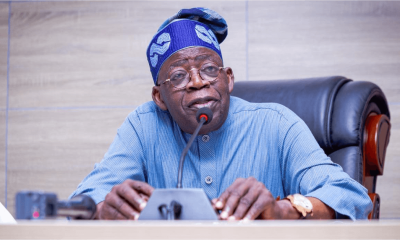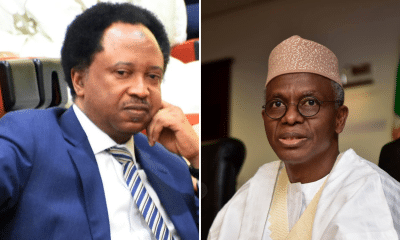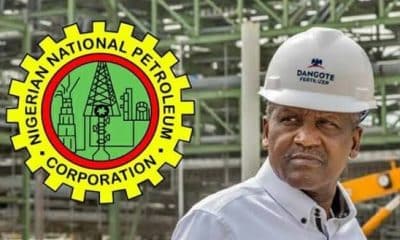Nigeria News
It Is So Shameful – Tinubu Speaks On Poor Electricity Generation In Nigeria

President Bola Ahmed Tinubu has expressed his disappointment with the poor electricity power generation in Nigeria despite the country’s vast size.
During the inauguration of a 31-member Presidential Economic Coordination Council at the Council Chamber within the Presidential Villa in Abuja, President Tinubu said it was shameful that Nigeria is still producing 4.5GW of electricity.
The Nigerian leader highlighted the necessity for creative approaches to address the nation’s economic issues, emphasizing the role of collaborations between the public and private sectors in spearheading economic changes.
He pointed out the issue of energy security in Nigeria, stressing the need for collective efforts to enhance the oil and gas industry and to expand the generation and distribution of electricity across the nation.
Tinubu said: ”We are determined to do that with your cooperation, collaboration, and recommendations. As a nation, it is so shameful that we are still generating 4.5GW of electricity.
”We must increase our oil production to two (2) million barrels per day within the next few months and we are determined to remove all entry barriers to investments in the energy sector while enhancing competitiveness.”
Tinubu Profer Measures
President Tinubu unveiled strategies that will be implemented alongside the National Construction and Household Support Programme to steady the economy, boost employment opportunities, and promote financial stability.
These strategies fall under the Economic Stabilization Programme, which includes initiatives for energy security, covering power, oil, and gas.
The goal is to raise the amount of electricity available to both homes and businesses from approximately 4.5 gigawatts to 6 gigawatts over the next six months, increase oil output to 2 million barrels per day by the end of the next year, and remove obstacles to investment in the sector to improve its competitiveness.
He mentioned that the Economic Stabilization Programme also focuses on agriculture and food security, aiming to increase the production of staple crops by small-scale farmers from 127 million metric tons in 2023 to 135 million metric tons this year.
Additionally, it seeks to enhance production by collaborating with larger-scale commercial farmers; and provide support to qualified farmers through satellite imagery for land use planning, crop rotation, and monitoring of agricultural expansion.
The President also explained that the health and social welfare sector will ensure the availability of essential medicines at more affordable prices for 80-90 million Nigerians and extend healthcare insurance to 1 million vulnerable individuals through a Vulnerable Group Fund in partnership with state governments.
It will also allocate 20,000 healthcare workers to serve 10-12 million patients in areas where their services are most urgently required; and upgrade 4,800 primary healthcare centres (PHCs), second-tier, and third-tier hospitals with renewable energy sources.
On the fiscal measures, Tinubu said, “Some of the interventions to improve access to finance for the housing sector, MSMEs, and the manufacturing sector are:
“Youth-owned enterprises: Support for new and existing youth-owned enterprises across all 36 states of the Federation, creating 7,400 MSMEs within the next 6-12 months;
“MSME support: A six hundred and fifty billion naira (N650 billion) facility will provide lower-cost short-term facilities to youth-owned businesses, manufacturers and MSMEs across various industries; food processing, pharmaceutical, agriculture, and wholesale and retail trade. This financing will be based on their current and future receivables, company rating, and market demand for products;
“A Manufacturing Stabilization Fund will rejuvenate up to two hundred and fifty companies and deliver lower cost (9.0%-11.0%) long-term facilities to large, medium-scale, and light manufacturers that produce finished goods for domestic and export markets;
“Sub-national Matching Fund: A Grow Nigeria Development Fund consisting of a single-digit interest rate loan portfolio with the Bank of Industry and a matching fund agreement with sub-national governments to grow MSMEs;
“Expanding the Bank of Industry’s Rural Development Programme: A fund to support rural economies in developing 300 new MSMEs for each state, including the Federal Capital Territory (Abuja), resulting in 11,100 new rural-based MSMEs across the Federation;
“Mortgage Finance Acceleration Facility: A facility that delivers affordable housing for all segments impacted by the cost-of-living challenge. This will support the construction of an additional 25,000 housing units.
“These fiscal measures will improve access to finance for MSMEs and, in the process, create 4.7 million direct and indirect jobs over a six to 12-month period.”












